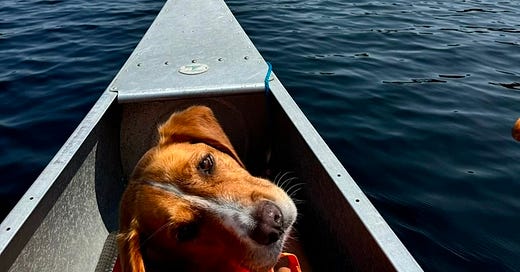Dear friends. When I started this Substack site last spring I had hoped to write prolifically about the craft of creative nonfiction, writing theory, and the intersection between the two. Many of these ideas emerged from thirty years of teaching, including many spent leading workshops for graduate students. That is still the plan. Upcoming posts will look at what I call “the gestalt of revision,” a topic I’ve published on elsewhere. I’ve also long been interested in the ethics of truth telling, research in creative nonfiction, and methods of creating “I-characters.”
Unfortunately, a cancer diagnosis has put me off my game, and writing is more difficult. I keep thinking that, as an essayist, I should see this experience worth writing about, as if all troubling experiences would benefit from exploration. And that’s another topic I want to write about: how writers find their subjects. My general advice has always been that essayists “look for trouble.”
But what kind of trouble? Experiences and observations that unsettle us, and hint at unresolved meanings that somehow matter to us. Not all of them do. Another kind of trouble is flagging stories we’ve always told ourselves that lock us into understandings that no longer are true. Therapists call this “narrative repair.” Writing subjects also emerge from the simplest source: surprise. As we write we say something we don’t expect say—an “instructive line”—that leads us into material we wouldn’t have found any other way. Perhaps this is most common. But this will only happen if we write even when we don’t know our subject.
Isn’t this one of the biggest challenges? Writing even when we don’t yet know our purpose, fueled the faith that surprise might follow? I have more to say about this but right now I just don’t feel like writing much, and what a splendid excuse I have! But writing here today, to you, was a pleasant surprise, and it reminds me of the obvious: writing to a imagined audience that feels receptive has the power to summon words even in the worst throws of chemo. This may be obvious, but it’s also complicated, and something I hope to write more about soon.





Bruce! 😲🤗❤️🩹🕊️
I hear you on this point: “as if all troubling experiences would benefit from exploration.” And as if anyone can say how much time needs to pass before a trouble presses itself into word-shapes.
I’m looking forward to all the topics on your writing agenda. But more importantly, just be well. Of course, there’s no doubt you’re getting the best available care. Jeepers.
What a great photo for the thoughts you've shared here, Bruce! At this point in my own writing journey, I'm grateful for the moments when the writing itself, even in the most mundane molding of sentences in revision lead to new ideas I hadn't anticipated. For me, those are some of the best moments, when something new is revealed.--good for the writer and hopefully, even better for the reader, a surprise especially welcome when you thought you knew exactly where you were headed, indeed, those unexpected revelations can be the most instructive. Be well, and please do keep writing... Can't wait till I can see you again in person :)